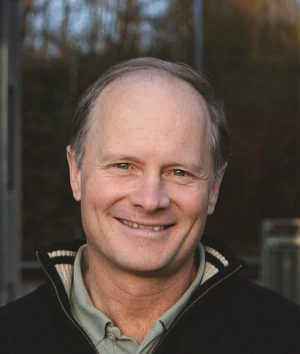FOR IMMEDIATE RELEASE

WASHINGTON, Aug. 16, 2023 — The American Chemical Society (ACS) announces R.J. Dwayne Miller as the 2023 recipient of the Helen M. Free Award for Public Outreach. The ACS Committee on Public Relations and Communications presents this award annually at the ChemLuminary Awards ceremony to an ACS member whose outstanding achievements have improved public recognition and appreciation for the contributions of chemistry. Miller received the award at this year's ceremony, which was held last night at ACS Fall 2023.
Miller, a chemistry and physics professor at the University of Toronto, has shown a lifelong pursuit of advocacy for science, inspiring others and leaving a lasting legacy in science education and outreach.
“R.J. Dwayne Miller has been a lifelong advocate for promoting the importance of chemistry,” says Robert A. Batey, professor of biological and organic chemistry at the University of Toronto. “His outreach efforts have occurred in parallel with a remarkable research career in which he has achieved some great milestones in chemistry.”
Throughout his illustrious career, Miller has reached a number of achievements, including the direct observation of atomic motions, which marks a fundamental space-time limit to imaging chemistry. At the same time, Miller has consistently demonstrated a deep commitment to inspiring and engaging the next generation of scientists and emphasizing the importance of science in society.
Miller's dedication to science promotion began early in his academic career at the University of Rochester, where he actively collaborated with local schools to develop innovative hands-on experiments. Notably, he developed a simple scanning tunneling microscope (STM), which allowed students to directly observe atoms. In the 1990s, STMs were distributed — along with training support for teachers — across the U.S., sparking excitement and curiosity in science among countless students.
Founding Science Rendezvous (SR) in 2008 is Miller’s most significant outreach accomplishment. SR is a nationwide event in Canada that focuses on the importance of science and chemistry and attracts more than 200,000 visitors annually. In the past 15 years, it has impacted nearly 1.5 million attendees. SR brings together more than 25 institutions, which hold collective events that catch media attention and allow people of all ages to engage with scientists.
“Everyone is born a scientist. All too often this innate curiosity is lost,” Miller says. “Science Rendezvous allows the scientific community to make science truly accessible, to answer the classic question ‘So what’s it good for?’ and allow everyone to discover their inner geek. In the process, we are sowing the seeds for the next generation of brilliant scientists and fostering a culture transformation where people fully appreciate the power of science to make a better world.”
Furthermore, Miller's commitment to science promotion extends beyond urban centers. He actively works with remote and Indigenous communities in Canada, involving residents there in science with experiences such as the Canada Wide Experiment. The event has evolved over the years, focusing on atmospheric chemistry related to climate change, water monitoring and The Million Tree Project. In 2015, Miller traveled to the Northwest Territories to collaborate with teachers and research institutes and provided these communities with an SR experience, which continues today.
Established in 1995, the Helen M. Free Award is an ACS ChemLuminary Award that recognizes outstanding achievements in public outreach. Free, a former ACS president, initiated many programs and activities designed to improve public awareness of chemistry’s contributions to the quality of daily life. Free passed away in May 2021, but her contributions to chemistry and public outreach live on through the thousands of people whose lives she touched and the awardees who continue her work.
###
The American Chemical Society (ACS) is a nonprofit organization chartered by the U.S. Congress. ACS’ mission is to advance the broader chemistry enterprise and its practitioners for the benefit of Earth and all its people. The Society is a global leader in promoting excellence in science education and providing access to chemistry-related information and research through its multiple research solutions, peer-reviewed journals, scientific conferences, eBooks and weekly news periodical Chemical & Engineering News. ACS journals are among the most cited, most trusted and most read within the scientific literature; however, ACS itself does not conduct chemical research. As a leader in scientific information solutions, its CAS division partners with global innovators to accelerate breakthroughs by curating, connecting and analyzing the world’s scientific knowledge. ACS’ main offices are in Washington, D.C., and Columbus, Ohio.
To automatically receive press releases from the American Chemical Society, contact newsroom@acs.org.
Note: ACS does not conduct research, but publishes and publicizes peer-reviewed scientific studies.

